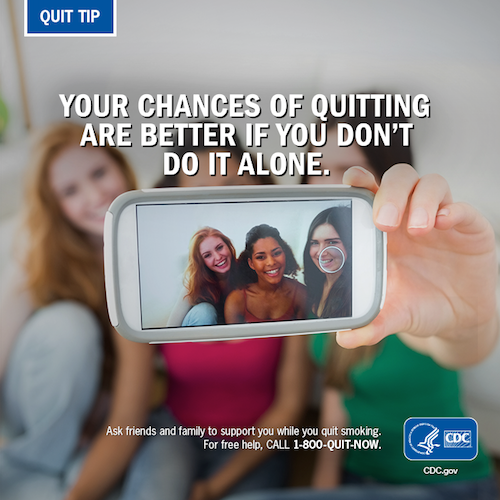Quit Tips
Quit Tips
Are you one of the more than 70% of smokers who want to quit? Then try following this advice.
1. Don’t smoke any cigarettes. Each cigarette you smoke damages your lungs, your blood vessels, and cells throughout your body. Even occasional smoking is harmful.
2. Write down why you want to quit. Do you want to—
- Be around for your loved ones?
- Have better health?
- Set a good example for your children?
- Protect your family from breathing other people’s smoke?
Really wanting to quit smoking is very important to how much success you will have in quitting.
3. Know that it will take commitment and effort to quit smoking. Nearly all smokers have some feelings of nicotine withdrawal when they try to quit. Nicotine is addictive.a Knowing this will help you deal with withdrawal symptoms that can occur, such as bad moods and really wanting to smoke.

There are many ways smokers quit, including using nicotine replacement products (gum and patches) or FDA-approved, non-nicotine cessation medications. Some people do not experience any withdrawal symptoms. For most people, symptoms only last a few days to a couple of weeks.a Take quitting one day at a time, even one minute at a time—whatever you need to succeed.
4. Get help if you want it. Smokers can receive free resources and assistance to help them quit by calling the 1-800-QUIT-NOW quitline (1-800-784-8669) or by visiting CDC’s Tips From Former Smokers®. Your health care providers are also a good source for help and support.
Concerned about weight gain? It’s a common concern, but not everyone gains weight when they stop smoking.b Learn ways to help you control your weight as you quit smoking.
5. Remember this good news! More than half of all adult smokers have quit, and you can, too.c Millions of people have learned to face life without a cigarette. Quitting smoking is the single most important step you can take to protect your health and the health of your family.
Sources:
a. National Cancer Institute. How To Handle Withdrawal Symptoms and Triggers When You Decide To Quit Smoking. October 2010 [accessed 2013 June 5].
b. National Institutes of Health. You Can Control Your Weight as You Quit Smoking. February 2010 [accessed 2013 June 5].
c. Centers for Disease Control and Prevention. Quitting Smoking Among Adults—United States, 2001–2010. Morbidity and Mortality Weekly Report [serial online] 2011;60(44):1513–9 [accessed 2013 June 5].
- Page last reviewed: September 15, 2016
- Page last updated: June 30, 2017
- Content source:


 ShareCompartir
ShareCompartir